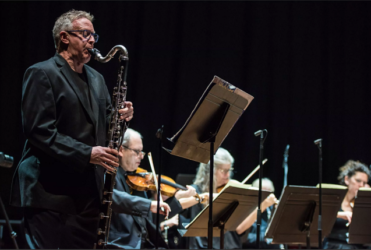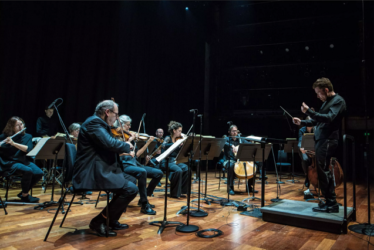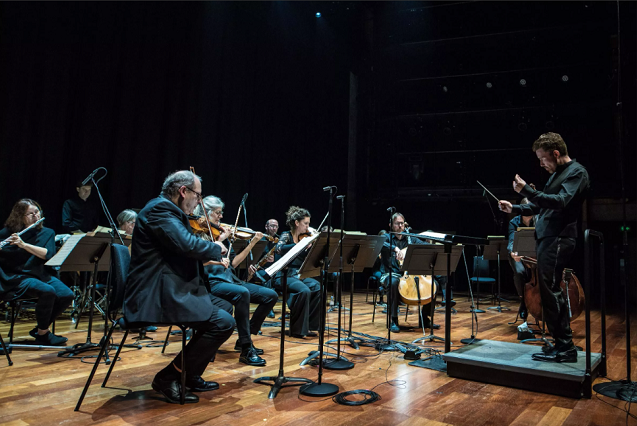 United Kingdom Xenakis: Mark van de Wiel (clarinet), Philip Howard (piano), Tim Gill (cello), Oliver Lowe, Colin Currie (percussion), London Sinfonietta / Geoffrey Paterson (conductor), Colin Currie Group, JACK Quartet. Queen Elizabeth Hall, London, 8.10.2022. (MB)
United Kingdom Xenakis: Mark van de Wiel (clarinet), Philip Howard (piano), Tim Gill (cello), Oliver Lowe, Colin Currie (percussion), London Sinfonietta / Geoffrey Paterson (conductor), Colin Currie Group, JACK Quartet. Queen Elizabeth Hall, London, 8.10.2022. (MB)

O-Mega; Palimpsest; Echange; Thalleïn for ensemble
Concret PH; Kottos; Rebonds A, Rebonds B
Psappha; Ikhoor; Tetras; Mikka and Mikka ‘S’; Pléïades
Iannis Xenakis’s music does not age. It is an ahistorical cliché to say so, likewise to say how stark, elemental, uncompromising, visceral, mysterious, unique, and so on it is. Those descriptions retain their force, whilst remaining open to exception and to broader questioning. But they came to many listeners’ mind, judging by the general conversation at the Queen Elizabeth Hall throughout this Xenakis Day, seeming to lodge themselves in a sort of collective consciousness through which works and performances could be heard. I did not, alas, hear all of the day’s events, but I attended the two principal concerts in the hall itself, hearing also three of the works on offer in the foyer in between. It was, I think, enough — although the way the closing Pléïades left one aurally bludgeoned was less on account of the astounding performances from the Colin Corrie Group of six percussionists than the unsuitability of the hall: a pity, one necessarily felt, whilst recognising that the Southbank Centre had done what it could.

The first works I heard were four from the London Sinfonietta and Geoffrey Paterson, in performances like everything here that seemed quite beyond reproach. (If you are going to play Xenakis, you tend to do it well.) O-Mega, for percussion and ensemble, made for a splendid opener; after that, his final work, we could only go back, at least temporally. Oliver Lowe’s opening bongo tattoo, a call to something, it seemed, met with implacable wind response, a hieratic ritual initiated in a theatre of music that might always have been, except it had not. Moving from 1997 to 1979, Palimpsest, for eleven instruments, offered piano (and other) scales reinvented before our ears, its lines unmistakeably architectural, even engineered — to borrow a little too readily from the composer’s other callings. Sawmill strings, wind fractals in which one could see as well as hear the geometry, virtuoso drumming and so much more: this was not easy listening, nor was it supposed to be. It was quite a journey to final, mesmerising piano-and-drum-led climax.
Échange, for bass clarinet (Mark van de Wiel) and ensemble, was similarly, yet entirely differently, primal. Again, it sounded unmistakeably that ‘this was how it must be’, in a world of violence (like our own) quite unconcealed. How can we continue so blithely, it seemed to ask, in a world imperilled by nuclear attack? Xenakis must have asked the same thing, or so we fancied. And yet, life in all its physicality, all its mental wonder, continued. The bass clarinet, somewhere between priest and Pierrot, bade new sounds emerge at will, though that was again sometimes no mean effort. The ensemble could, though, and did respond. The startling weirdness of an E-flat major chord could hardly have sounded more alien: a signal, it seemed, from yet another planet.
Thalleïn, the Sinfonietta’s first commission (1984) from Xenakis, was as implacable as anything yet heard, perhaps still more so. Siren-like — ambulance, not temptress — its opening had us browbeaten, and thereby strangely receptive to proliferating subtleties to come, even to the point of finding them inviting. Masses of sound continued to confront us to exhilarating effect. Ascending and descending scales led both ways, so it seemed, to hell, their mockery a deeply serious business. Piccolo pierced our consciousness, at times painfully, like a moment of alarm on an intensive care unit screen. There was blood-letting aplenty, the final string swarms, punctuated by percussion, as far as ever from consolation.
Concret PH, like most, possibly all, musique concrete actually did seem to have aged — though even that is dependent on our knowing the unknowable Rankean ‘how it really was’, and how can we? Even if we had been there, in the 1958 Expo Philips Pavilion which Xenakis as Le Corbusier’s assistant designed, memory would play its tricks. There is no ‘authenticity’; there never was and anyone who tells you otherwise is a fool or a charlatan. How admirably full of integrity Xenakis and his fellow avant-gardists seem contrasted with those snake-oil-salesmen to come. No, you cannot hear the St Matthew Passion as if you had never heard Xenakis; more to the point, why would you wish to? Or is that just to invest my own fantasy of post-war ‘inauthenticity’ as super- or supra-authenticity? There was, at any rate, room for fantasy here, if one closed one’s eyes and listened. Here was another world: inaccessible, perhaps, like that of Bach’s Leipzig, yet an idea not without its own seduction.
Tim Gill’s performance of Kottos for cello really deserved the main hall, as did Lowe’s Rebonds A and Rebonds B. They were mightily fine accounts, though, wherever one heard them, the first’s evocation of the horrible hundred-armed creature, progeny of Uranus and Gaia, a song both fragile and stark: deeply rooted, if hardly in the conventional harmonic sense. Or perhaps it was, for I felt the implication at least of a harmonic language, even if I could never know it, even if it were in fact unknowable. There was whimsy in the asides, even as the ‘creature’ gained strength. And the music reached something akin to ecstasy, doubtless more effortful than that of Messiaen, yet no less genuine for that. The state of frenzy reached was a liberation of sorts, not least amidst the hell of our current existence. Both Rebonds pieces, A in particular, invoked — even if we knew not what (that inscrutability again). One was drawn in, less hypnotised than converted, in powerfully cumulative, remarkably different experiences of control and abandon.
In the evening, Colin Currie’s Psappha seemed almost designed to cement our growing sense of structure as fundamental in an emphatic, again quasi-engineered sense to Xenakis’s work. The extraordinary musicianship on show never threatened to take on a life of its own; structure remained paramount. There seemed no other way. And the silences: they might almost have been from Bruckner. Here, again, was a summoning both archaic and not. Pléïades, here ordered ‘Metaux’, ‘Claviers’, ‘Peaux’, ‘Mélanges’, suffered, as I said, from an ear-splitting quality that made it, for me at least, too difficult to take, the sixxens too rarely emerging, to quote Xenakis, as ‘clouds, nebulas, and galaxies of the fragmented dust of beats’. Even here, though, ‘the idea of periodicity, repetition, duplication, faithful, pseudo-faithful,’ and above all ‘unfaithful copy’ shone through. ‘Claviers’ came closer to polyphony, its ripples even a little Boulezian, though I am not sure either composer would have approved of the comparison. Its patterns emerged as if on multiple screens before our ears. Drummed hypnosis in ‘Peaux’ prepared the way for less a synthesis or recapitulation than a gigantic rehearing, even rewriting when all instruments united in ‘Mélanges’. It was ear-splitting, again, at times, but in quite an aural landscape, at times almost dreamed.
Rhythm, its problems and opportunities, had haunted much of the string music in between, especially Ikhoor for string trio and Tetras for string quartet, both given by the JACK Quartet. Vivid, fiercely directed narratives marked out both, as did superhuman unanimity of purpose. Tetras seemed somehow both stranger and familiar, the strangeness heightened by sounds I might have sworn had emerged from electronics, did I not know otherwise. Voices, of whatever sort, bore witness, as if from Luigi Nono’s long-estranged cousin. Two works for violin solo, Mikka and Mikka ‘S’, were given by the quartet member absent for the trio, Austin Wulliman. Measured swarming, control in dilemma, line tracked as if in a real-time graph: throughout one ‘felt’ the mathematics, or imagined one did. As in every performance here, there was a rightness that left one knowing, like this music or not, it deserved as well as demanded to be heard.
Mark Berry
